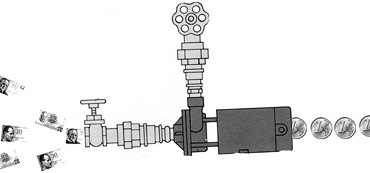

Overpriced Musings:
Euro Nation

E-Mail Us
Your Comments
|

art/Marty Kelley
The Euro Nation
Life in the European Union is about to get pretty interesting.
On Tuesday, January 1, 2002, the "euro," which is already a monetary unit on paper, will be fully adopted as legal tender in twelve of the fifteen nations in the EU: Belgium, Germany, Greece, Spain, France, Ireland, Italy, Luxembourg, The Netherlands, Austria, Portugal, and Finland. For two months there will be a period of dual currency, during which both forms of cash (old and new) will be spent, and all change will be given in euros. On February 28, each of the above countries' sovereign currency will be spent for the last time.
I meditated on the finality when I heard about itfor over two centuries, the modern French Franc has been the lifeblood and store of value for all goods and services sold and performed in France. And soon it will be no more, replaced by a currency that will supersede it and make the economy a twelfth of a greater whole.
Imagine suddenly waking up one morning and finding that we now share a common currency with all of the nations in North and Central America. Countries, regardless of their being richer or poorer, suddenly merge with your own, economically. The dollar, gone the way of the wood burning stove, useless and obsolete, replaced by newfangled cash called "northams." A hamburger at Wendy's now costs a half-northam. A tank of gas costs eleven northams. And your country no longer has the right to control its own economic policy, replaced by a continental central bank.
While this scary North American scenario is probably not going to happen for at least several decades, a similar one is going to happen in Europe in four months. And I wondered how many people in the general public had a say as to whether or not their nation was going to adopt the euro.
I found that the Economic and Monetary Union (EMU) in Europe was decided almost solely by parliaments of the EU member states. So far, Denmark is the onlycountry of the fifteen whose citizens have had a direct referendum on euro adoption. The Danish have an enormous amount of welfare and very high taxes, and that's the way they like it. Accepting the euro would mean changing these comfortable economic conditions, and so they voted it down by a large margin. According to a May 2001 article in the London Guardian, an average of only 55 percent of people in the new Eurozone support the new currency, based on results of a poll conducted by Eurobarometer, which is published by the EU.
 England and Sweden, the other EU states not joining the euro, are tiptoeing toward referendums, but aren't willing to take that risk. Britain's government has refrained from going in on the euro, taking a wait-and-see stance. It would cost Britain some 36 billion pounds to convert to euros, a hefty price tag considering that the economic benefits would probably not cover the costs for a very long time. Britain also has less unemployment than Eurozone, more reason to keep its economy to itself. So most of the reasons for not adopting the euro, I found, were reasons of self-interest. Governments are surprisingly reluctant to discuss any constitutional and political implications, dismissing them in favor of economic issues.
England and Sweden, the other EU states not joining the euro, are tiptoeing toward referendums, but aren't willing to take that risk. Britain's government has refrained from going in on the euro, taking a wait-and-see stance. It would cost Britain some 36 billion pounds to convert to euros, a hefty price tag considering that the economic benefits would probably not cover the costs for a very long time. Britain also has less unemployment than Eurozone, more reason to keep its economy to itself. So most of the reasons for not adopting the euro, I found, were reasons of self-interest. Governments are surprisingly reluctant to discuss any constitutional and political implications, dismissing them in favor of economic issues.
Benefits of the euro, according to its supporters, are cheaper mortgages and lower consumer prices. Dealing with alternate currencies is a risky business venture, because there is no way to adequately predict return on investments when those investments are enumerated in other countries' money. The exchange rates fluctuate to such enormous degrees that a business unit can be profitable in another currency, and still lose money when that is translated to the currency of the home state. The euro smooths out these walls and leaves behind an open road upon which the commerce can flow with ease and less apprehension.
However, by adopting the euro, the new currency is thrusting together twelve nations of Europe who have enormous legal, economic, generational, and cultural differences that aren't likely to disappear in the near future. Because of that, labor mobility could be a tremendous problem across the Eurozone, and thoughts about contributions to social security and private pensions probably aren't going to mix. Differences in employment rates in certain regions will make it difficult for all the nations to exist under a single interest rate and living wage. Countries within the zone will not have the power to make the adjustments to their economy necessary to offset sharp up or down turns. This could turn out to be a tremendous shock to regional economic stability, with massive short and medium-term crises.
The consequences of a monetary union seem rather obvious and extremely ominous. History has arguably shown that the single most important force behind power, wars and influence is money. Economics is the true lord of our actions. A society operates because we need to perform favors for others to earn "favor coupons." We then use these coupons to obtain the favors that we need. These favors are the lifeblood of a nation, and currency is their measure. The self-contained system makes a country into a sort of organism, which then trades and interacts with other organisms.
When nations join together and seamlessly eliminate the economic barriers between them, the emergence of a superstate is the only logical consequence. If you are not part of the union, your former trading partners are no longer small rodents. They become a giant bear, a great economic bloc with muscle and ferocity. To protect this wealth, the government of it must conceivably strengthen and provide for a common defense. Leading European bankers and politicians do not believe that the euro will work in the long-term without a European central government.
So with all of these shining reasons against, why this push, this barreling, headlong drive toward centralization? According to a report in The London Times earlier this year, 78% of Britons know nothing to very little about the EU and its gigantic corporate and political structure that is assimilating Europe. Mass ignorance may lead to loss of sovereignty. We as Americans cannot control much of this, but we can turn a watchful eye to the forces of globalization overseas and observe carefully. It may turn out to be a dress rehearsal for things to come on other continents.
•
Email your feedback on this article to editor@impactpress.com.
Make an IMPACT
Other Overpriced Musings by Don Pflaster:
|




